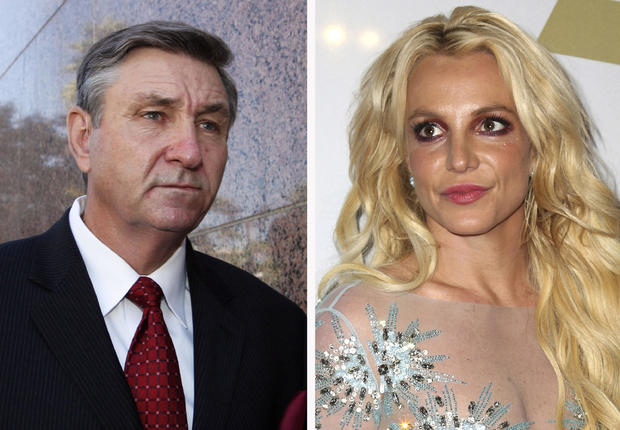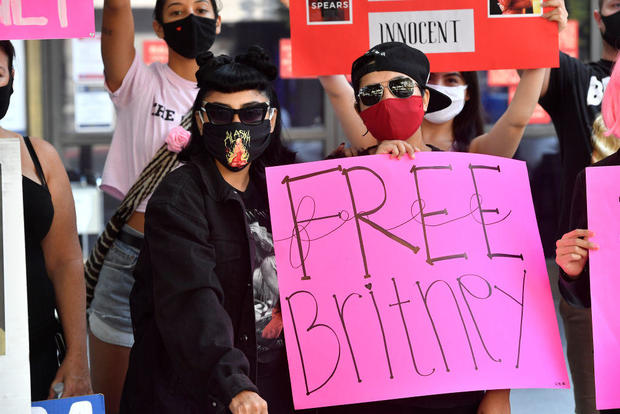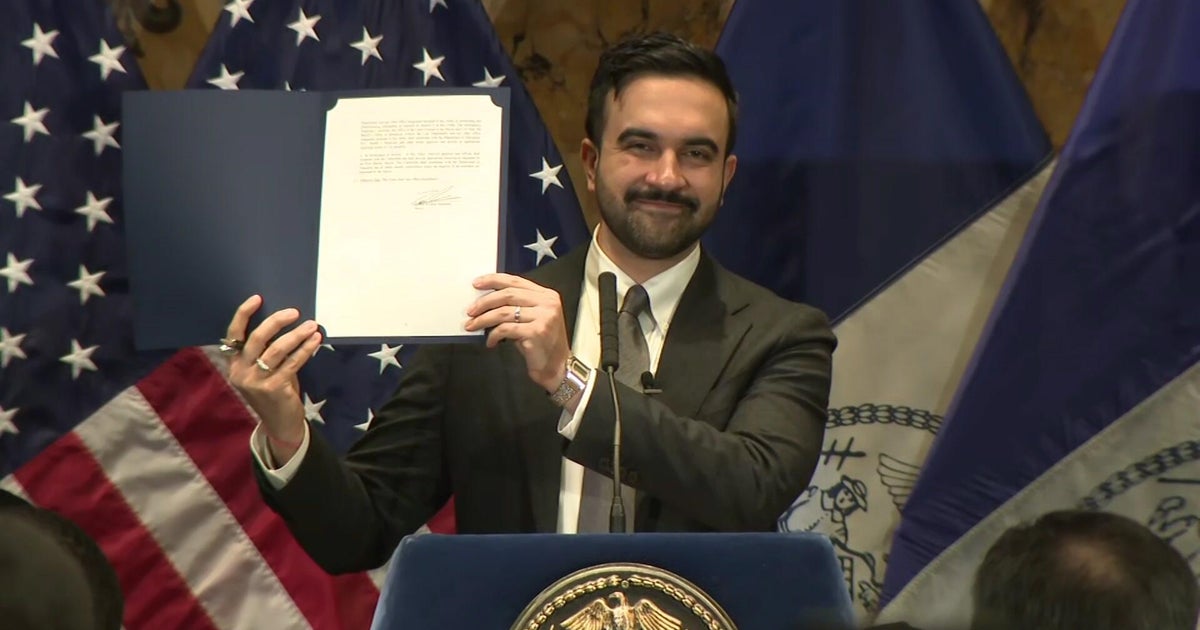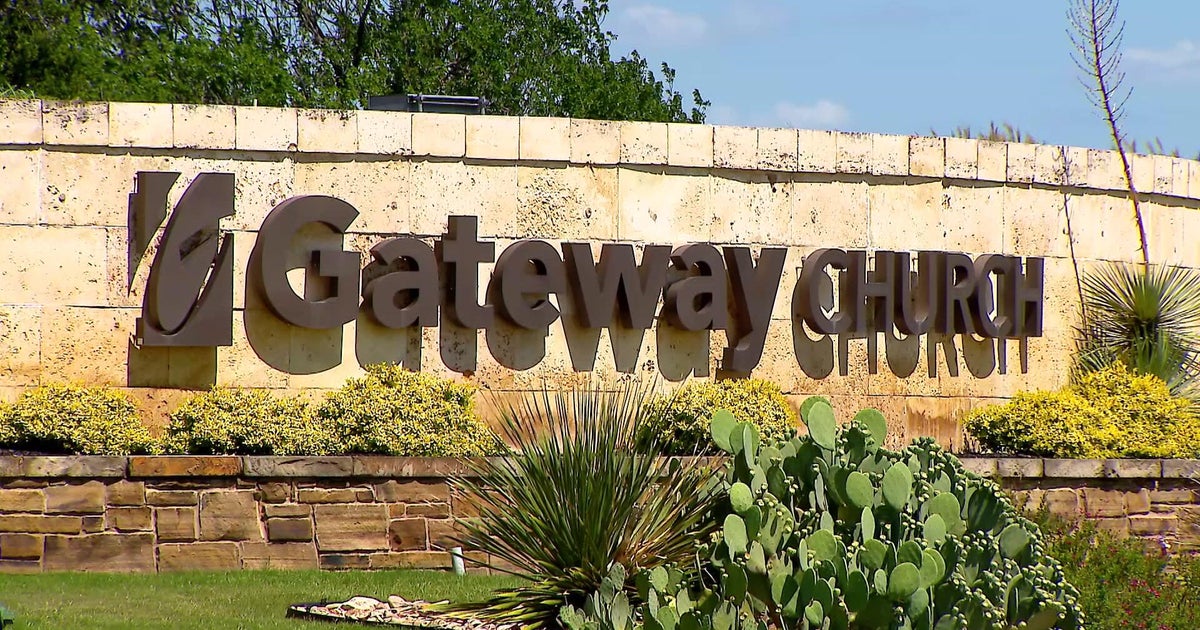Britney Spears' conservatorship, explained
The legal controversy surrounding Britney Spears is no secret. The pop star is fighting for changes to her court-appointed conservatorship, which has controlled her career and finances since 2008.
Last month, Britney, 39, publicly addressed the court for the first time, calling the conservatorship "abusive" while demanding an end to the arrangement. "I don't think I can live a full life," she said. "I feel ganged up on, I feel bullied and I feel alone."
Britney has also pushed to remove her father, Jamie, from the conservatorship and has vowed to put her career on hold until that happens. Jamie currently acts as a co-conservator of her estate along with an outside financial group, the Bessemer Trust. But after Britney said she wanted out, the group filed a petition to remove itself from the arrangement.
"I shouldn't be in a conservatorship if I can work and provide money and work for myself and pay other people," Britney said last month. "It makes no sense."
What is a conservatorship?
A conservatorship is legally defined as a court case where a judge appoints an individual or organization, called the conservator, to care for someone who "cannot care" for themselves or who cannot manage their own finances, according to the Judicial Branch of California.
Zoe Brennan-Krohn, a staff attorney with the ACLU, told CBS News conservatorship laws will vary from state to state, making it difficult to determine exactly how many exist across the country.
The law supports conservatorships when less restrictive options are ruled out, Brennan-Krohn said, but too often, they're granted as a "first resort" when someone encounters difficulties or experiences age-related disabilities.
Brennan Krohn said Britney is "one of the untold thousands nationwide" under a guardianship or conservatorship, calling her case unique because of her fame and fortune. "But it is also interesting because it is, in some ways, quite typical. We see across the country that people get into conservatorships and guardianships that they can't get out of."
How did we get here?
In 2008, Jamie Spears was granted the conservatorship after Britney purportedly struggled with mental health issues and was hospitalized. After Britney was released, a Los Angeles court made the conservatorship permanent, giving her father and another co-conservator power over her finances and medical decisions.
Jamie argues that his conservatorship is working. Under his order, his legal team says, Britney's estate has gone from being in debt to having a valuation of more than $60 million.
Last November, his legal team said Jamie has worked hard to restore Britney to "good health, reunite her with her children, and revive her career."
"Throughout his service as Conservator, Mr. Spear's sole motivation has been his unconditional love for his daughter and a fierce desire to protect her from those trying to take advantage of her," Jamie's legal team wrote. "He wants his daughter to be happy, healthy, protected and thriving. His love for Britney is a material factor in how he has been able to turn her estate around from being in the red to what it is now."
Why does Britney want her father out?
Last August, the pop star's court-appointed attorney said Britney "strongly opposed" her father's position as the sole conservator of her estate and asked the court to limit his control. Her attorney, Samuel D. Ingham III, said Britney "strongly prefers to have a qualified corporate fiduciary in the role" and she's made several attempts to do so.
Britney requested that Jamie's temporary replacement, Jodi Montgomery, be named the permanent conservator of her person. Montgomery, a professionally licensed conservator, took over the role in 2019 when Jamie volunteered to step down, citing health reasons.
Last November, a judge granted the singer's wish to appoint an outside financial group, Bessemer Trust, as co-conservator. She is still requesting the court to remove her father and allow Bessemer Trust to become the sole conservator of her estate — something Jamie and his legal team have continued to fight.
Addressing the court, Ingram reportedly called Britney a "high-functioning conservatee" who deserves to know what action her father might be taking over her estate. He also said Britney is "afraid of her father" and that she had not spoken to him for a long time.
In February, the singer's counsel said "it would be highly detrimental to Britney's interests" to allow her father to be the sole person in charge of her estate.
Brennan-Krohn, who works on the ACLU's Disability Rights Program, said there are certain risks that could come with the appointment, including "financial, physical and emotional abuse."
"Even when there is no abuse, conservatorships limit a person's ability to advocate for themselves, learn from their decisions and mistakes, and grow and develop. There is a risk in being told that your opinions, your likes and dislikes, don't matter — it makes it harder to stand up to abuse or neglect," she said.
"In any conservatorship, we would want to know that the real risks (and benefits) of both conservatorship and its alternatives have been seriously weighed."
What has Britney said about the case?
For years, Britney remained tight-lipped throughout the legal battle, speaking only through her legal team and by making subtle comments alluding to the arrangement. But on June 23, she broke her silence by making a public statement to the court, pushing the judge to end the conservatorship.
Among the most shocking accusations, Britney claimed she was forced to take strong drugs after refusing to perform, stopped from removing a birth control device and has been allowed little to no privacy throughout the conservatorship.
"I've lied and told the whole world I'm OK and I'm happy — it's a lie. I thought just maybe if I said that enough, maybe I might become happy because I've been in denial. I've been in shock. I am traumatized," she said. "You know, fake it till you make it. But now I'm telling you the truth, OK? I'm not happy. I can't sleep. I'm so angry it's insane. I'm depressed. I cry every day."
Britney requested to hire her own attorney, cut back on therapy sessions and end the conservatorship without extensive mental health evaluations. "This conservatorship is doing me way more harm than good," she said.
What is #FreeBritney?
Many of Britney's fans have staged protests outside the Los Angeles courthouse where status hearings are held in the case. There's even a podcast, Britney's Gram, which is dedicated to dissecting her Instagram and social media posts. Her fans have used the hashtag #FreeBritney to bring attention to her legal battle against her father.
In September of last year, Britney's legal team acknowledged fans following her legal battle.
"At this point in her life when she is trying to regain some measure of personal autonomy, Britney welcomes and appreciates the informed support of her many fans," her attorney said in opposition to her father's attempts to seal information from the public. "Although the sealing motion is supposedly for her 'protection,' Britney herself is vehemently opposed to this effort by her father to keep her legal struggle hidden away in the closet as a family secret."
"In this case, it is not an exaggeration to say that the whole world is watching."






